It was with great sadness that we learned about the physical transition this past weekend of Cuban revolutionary Harry "Pombo" Villegas. Pombo was 79 years old and although he was certainly virtually unknown outside of anti-colonial, revolutionary socialist communities, his life has provided strong inspiration to millions of us for the last 60+ years.
1 Comment
Dave allen
7/9/2024 09:57:19 am
Investment is one of the best ways to achieve financial freedom. For a beginner there are so many challenges you face. It's hard to know how to get started. Trading on the Cryptocurrency market has really been a life changer for me. I almost gave up on crypto at some point not until saw a recommendation on Elon musk successfully success story and I got a proficient trader/broker Mr Bernie Doran , he gave me all the information required to succeed in trading. I made more profit than I could ever imagine. I'm not here to converse much but to share my testimony; I have made total returns of $20,500.00 from an investment of just $2000.00 within 1 week. Thanks to Mr Bernie I'm really grateful,I have been able to make a great returns trading with his signals and strategies .I urge anyone interested in INVESTMENT to take bold step in investing in the Cryptocurrency Market, he can also help you recover your lost funds, you can reach him on WhatsApp : +1(424) 285-0682 or his Gmail : [email protected] tell him I referred you
Reply
Leave a Reply. |
Archives
March 2023
Categories |


 RSS Feed
RSS Feed
